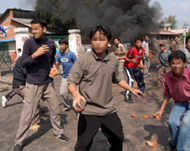Nepal troops fire on protesters
Security forces have fired at demonstrators who broke a curfew to protest against Nepal’s king, killing one and injuring at least two others in the resort town of Pokhara.

Yogesh Bhattarai, a leader of the Communist Party of Nepal, UML, said the man was shot dead in Pokhara, about 200km west of the capital Kathmandu, during a pro-democracy rally on Saturday.
Gangadhar Baral, who was injured in the firing, said a group of protesters were throwing stones at security forces when the soldiers shot at them.
He was taken by other protesters for treatment of face and head injuries at Pokhara’s main hospital where a second protester was also taken with leg injuries.
Witnesses said that Pokhara was hit by massive protests through the day and activists fought troops who fired dozens of tear gas shells to quell them.
The violence came on the 16th anniversary of democracy in the Himalayan kingdom, where mainstream political parties began a four-day nationwide general strike and protests on Thursday.
Curfew
The parties had planned a massive show of strength with a big rally in the heart of Kathmandu on Saturday.
 |
|
Hundreds of protesters violated |
But King Gyanendra imposed an 11-hour curfew and soldiers patrolling the streets ordered people indoors as it began at 10 am (0415 GMT).
Armoured personnel carriers blocked access to the venue and foiled the planed rallies.
Clashes
Dozens of young activists elsewhere on the outskirts of the capital defied the curfew and clashed with riot police.
“Gyanendra leave the country”, “Death to Gyanendra”, “Long Live Democratic Republic”, the youths shouted and threw stones at riot police.
The police responded by charging at them with batons and firing tear gas shells to disperse them.
The four-day strike that ends on Sunday is aimed at pressuring Gyanendra to give up the direct rule that he seized in February last year after firing the prime minister.
Gyanendra says he acted because of the growing communist insurgency, which has killed about 13,000 people since 1996.